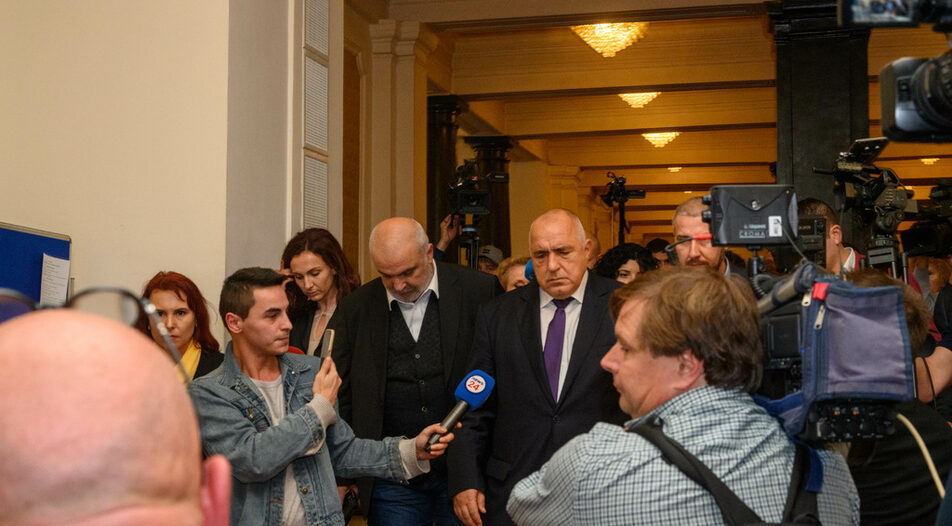GERB narrowly wins the fifth consecutive parliamentary vote in two years, Vazrazhdane takes over MRF as the third largest party, Slavi Trifonov's TISP somehow crawls back into the National Assembly and the political deadlock continues.
That, in short, is the outcome of the 2 April early parliamentary elections that attracted a low (40%) turnout, similar to last October's vote. The result is a comparatively less fragmented 49th Parliament Assembly that will have six parties, which, however, are just as unlikely to produce a viable coalition as the seven parties in the previous government.
Now the ball is back in the court of ex-PM Boyko Borissov, whose GERB faction pulled ahead with 26.7% of the vote to the reformist WCC-DB coalition's 24.7%, according to 86% votes counted. GERB will have to attempt one of two options - both of which look difficult - to convince its main antagonist WCC-DB to form some form of coalition, or to seek wider support from at least two of the smaller parties (or three, if TISP is one of these).
The vote will be remembered for the return of paper voting, which once again caused serious trouble for polling commissions. The count, which was mostly over by 1pm in October 2022, continues as of 10am on Monday morning, due to the overcomplicated system that involves untrained polling commission members trying to calculate the combined results of machine voting and paper ballots.
The results: GERB has the edge
Throughout the whole of Sunday, it appeared from exit polls that the vote could go either way - first, GERB took the lead, then WCC-DB seemed to have caught up, but by midnight the parallel counting showed the reformists trailing Mr Borissov's party by 1% - a difference that climbed to 2% by the morning. None of the leaders of the reformists - or of GERB for that matter - has yet commented on the vote and the next steps.
So far, it appears that both parties might have lost support in absolute numbers, with the trend being more obvious for WCC-DB, which so far has 523,000 votes compared to almost 700,000 votes combined in the last election. At 86% of votes counted, GERB seems to be 70,000 votes behind its October 2022 result.
The big winner is definitely Vazrazhdane, which climbs to third place, overtaking MRF, which was expected to retain the bronze when votes from abroad come in. As of 10am, Kostadin Kostadinov's Russophile faction gets 309,000 votes - or 14.5% of the total, which is 55,000 votes better than their previous result. MRF is about 65,000 votes behind its October 2022 result, a loss of votes that comes only from domestic voting. Since the ethnic party is one of the factions that relies on controlled voting the most, this might mean that it saw little need to activate its networks of influence this time around, expecting an inconsequential vote.
BSP, one of the main culprits behind the reintroduction of paper ballots, claiming that its predominantly elderly electorate has abstained from machine voting, does not seem to have benefited from the return of paper. Kornelia Ninova's Socialists got 210,000 votes, or 8.95% of the vote, compared to 230,000 last time around.
Finally, Slavi Trifonov's TISP party somehow makes it back into parliament with more or less the same tally (98,000) as last time, likely because of the fragmentation of support for smaller parties like The Left and Stefan Yanev's Bulgarian Rise, which remain quite below the 4% barrier.
Distribution of mandates and possible coalitions
If the relative distribution of votes remains the same and voter turnout is around the 40% mark, the distribution of mandates in the next parliament would look like this: GERB gets 70 out of 240, WCC-DB is second with 64, Vazrazhdane wins 38 seats, MRF - 33, BSP gets 24 and TISP - 11.
Of course, these are subject to slight change, but in practical terms there is little difference - the only mathematically possible two-party coalition is between the winners and the runners-up, which would be extremely hard to pull off. If WCC-DB won the vote (as it was expected), they could have somehow tried to convince their voters that a coalition with GERB is the only possible alternative to President Rumen Radev's undisputed rule. But now it is Mr Borissov who will be dictating the rules and if the reformists agree to them, this would result in even weaker support in the next election - be it a new early vote or in the October local elections.
The only other possibility for cabinet that remains is if GERB manages to pass some form of an "expert" cabinet of the likes of the Gabrovski cabinet last autumn, calling for wide support from all parties. Judging from the lack of success of the Gabrovski cabinet, however, this is also going to be an uphill battle.
It appears that the political deadlock in the country will continue for the foreseeable future.
GERB narrowly wins the fifth consecutive parliamentary vote in two years, Vazrazhdane takes over MRF as the third largest party, Slavi Trifonov's TISP somehow crawls back into the National Assembly and the political deadlock continues.
That, in short, is the outcome of the 2 April early parliamentary elections that attracted a low (40%) turnout, similar to last October's vote. The result is a comparatively less fragmented 49th Parliament Assembly that will have six parties, which, however, are just as unlikely to produce a viable coalition as the seven parties in the previous government.












